| Srl | Item |
| 1 |
ID:
147950
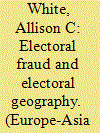

|
|
|
|
|
| Summary/Abstract |
Despite United Russia’s (Edinaya Rossiya—UR) dominance in repeated Russian legislative elections, the correlates of the party’s electoral support remain noticeably understudied beyond the influence of electoral manipulation. I pinpoint the specific contours of UR’s strongholds in the two most recent parliamentary elections in Russia—2007 and 2011—focusing on raion- and regional-level correlates of the vote using an original dataset. UR has been undergirded by geographically concentrated ethnic minorities and the countryside, and these patterns of support have persisted even in the absence of fraud, suggesting that the dominant party’s electoral windfalls cannot be attributed solely to electoral malfeasance.
|
|
|
|
|
|
|
|
|
|
|
|
|
|
|
|
| 2 |
ID:
091220
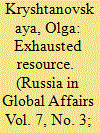

|
|
|
| 3 |
ID:
111703
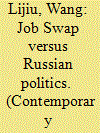

|
|
|
| 4 |
ID:
084639
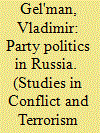

|
|
|
| 5 |
ID:
084645
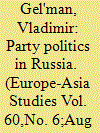

|
|
|
| 6 |
ID:
084647
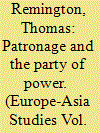

|
|
|
| 7 |
ID:
093722
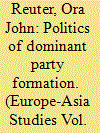

|
|
|
|
|
| Publication |
2010.
|
| Summary/Abstract |
This article analyses the emergence of United Russia (Edinaya Rossiya) as a dominant party by examining the behaviour of Russia's governors. Using original data on when governors joined United Russia, the article demonstrates that those governors with access to autonomous political resources were more reluctant to join the dominant party. By showing that Russian elite members made their affiliation decisions on the basis of calculations about their own political resources rather than simply being coerced by the Kremlin, this article provides evidence for a theory of dominant party formation that casts the problem as a two-sided commitment problem between leaders and elites.
|
|
|
|
|
|
|
|
|
|
|
|
|
|
|
|
| 8 |
ID:
116119


|
|
|
|
|
| Publication |
2012.
|
| Summary/Abstract |
Last winter, a wave of mass demonstrations suddenly broke the surface calm of Russian politics. A new middle class, born of the oil-based prosperity of the last decade, took to the streets to voice its opposition to the perceived corruption of the political elite, especially United Russia, the ruling party of then Prime Minister Vladimir Putin. For a time, as the protest movement gained momentum, the very foundations of the regime appeared to shake. But in the March 2012 presidential election, Putin managed to win comfortably in the first round, and despite widespread charges of manipulation, even the opposition conceded that he had earned a convincing victory.
|
|
|
|
|
|
|
|
|
|
|
|
|
|
|
|
| 9 |
ID:
120684


|
|
|
|
|
| Publication |
2013.
|
| Summary/Abstract |
This study examines the support for United Russia in 43 regional assembly elections which were conducted over the period from March 2008 to March 2011. In contrast to previous studies, which have tended to focus on the overall results of regional elections or just on the party-list votes, it provides a quantitative analysis of the votes for United Russia in the plural single member district contests. By widening the traditional focus on the aggregate results and party-list voting the study brings to light important variations in the patterns of United Russia's electoral domination of regional assemblies. The specific form of United Russia's domination depends on the configuration of regional elites and their strategies. Social and economic features of the regions have little impact on the degree and modes of United Russia's electoral domination, but influence the ability of regional leaders to ensure electoral mobilisation in the regions and this is more significant the higher the level of the election.
|
|
|
|
|
|
|
|
|
|
|
|
|
|
|
|
| 10 |
ID:
166791


|
|
|
|
|
| Summary/Abstract |
The primary elections of the United Russia party serve as a tool for party organisation and voter mobilisation. In this study, we employ United Russia’s capacity to mobilise voter turnout in the 2016 primary elections as an indirect indicator of the strength of party-controlled regional political machines. Our analysis of the results of the 2016 Duma elections in 83 regions of Russia demonstrates that voter turnout in the spring 2016 party primaries of United Russia to a significant extent explains cross-regional variation in party success.
|
|
|
|
|
|
|
|
|
|
|
|
|
|
|
|
| 11 |
ID:
164515


|
|
|
|
|
| Summary/Abstract |
Grounded in the main theoretical approaches to the study of electoral volatility, this article examines cross-regional variations in the levels of volatility for United Russia (UR) in Duma elections over the period 2003–2016, which are juxtaposed with the level of volatility for the Kremlin’s candidates in presidential elections. The main finding is that ‘regime type’ or, more precisely, ‘authoritarianism’ is the key explanatory variable. Stronger authoritarian rulers are able to control regional elites and ensure the best results for UR by exerting administrative pressure on voters. This reduces the level of volatility in support for UR. At the same time, economic and institutional explanations have a partial significance. Here, Duma elections differ from presidential elections, which demonstrate a much lower degree of volatility; in addition, economic factors appear insignificant.
|
|
|
|
|
|
|
|
|
|
|
|
|
|
|
|